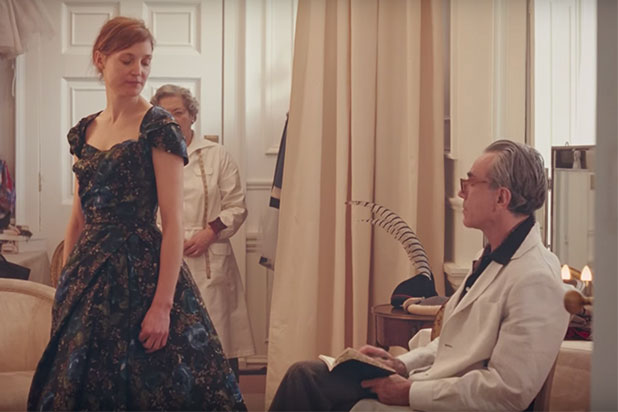Director: Paul Thomas Anderson
A beautifully-constructed and acted film, though one that seemed to be missing one or two essential ingredients to fully resonate with me.
The movie follows the romance between Stevens Woodcock (Daniel Day-Lewis) and Alma (Vicky Krieps). Woodcock is a 60-something-year-old fashion designer of the highest order in 1950s England, catering to artistocrats and royalty both local and international. A quirky, finicky sort, Woodcock has never been married and tends to only maintain brief relationships with an cycle of ever-changing young muses. When he attracts what is likely to be the latest object of his peculiarly self-absorbed affections, Alma, he soon learns that she has more of an individual will than his past loves. Alma's independent spirit begins to play havok with Woodcock's guarded emotions, eventually affecting his ability to maintain his intense focus on his fashion design business, which he runs with his stern elder sister, the business-savvy Cyril (Lesley Manville).
As I write this, it has been about a week since I saw the movie, and I am still processing the film and deciding exactly how much I liked it. And I did like it. Yet, it still has not completely grabbed hold of my imagination or spirit in the way that other Anderson movies have, such as There Will Be Blood or even Boogie Nights, in its way. P. T. Anderson loves immersing himself and us viewers into worlds which we are unlikely to have seen before - whether the world of the changing 1970s pornography business, the ruthless world of big oil around the turn of the 20th century, or the world of aristocratic fashion in 1950s England. And like those earlier films, Phantom Thread presents that last world in a highly engaging way, even for someone like me who knows and cares very little about it. By constructing setting and characters so skillfully, we are drawn into just what makes the highly prickly Woodcock and his exquisite work so very attractive to those around him.
A large part of the setting's appeal is the lush and lavish sets and costumes on dislpay throughout the picture. Again, I am one who cares little about fashion, but it is hard not to enjoy the visual splendor of this movie, at least on a purely aesthetic level.
This is, obviously, just my current read on the movie. Even now I feel that other interpretations can be made; I'm likely to rethink my own feelings about this movie, even if I don't bother to see it again any time soon. It is one, however, which I would recommend to most people. Provided that you don't grow bored with very "British" movies that tend to move with a very measured pace and focus on rather subtle interactions between oft-uptight characters, then you're likely to find something to like in this one.
A beautifully-constructed and acted film, though one that seemed to be missing one or two essential ingredients to fully resonate with me.
The movie follows the romance between Stevens Woodcock (Daniel Day-Lewis) and Alma (Vicky Krieps). Woodcock is a 60-something-year-old fashion designer of the highest order in 1950s England, catering to artistocrats and royalty both local and international. A quirky, finicky sort, Woodcock has never been married and tends to only maintain brief relationships with an cycle of ever-changing young muses. When he attracts what is likely to be the latest object of his peculiarly self-absorbed affections, Alma, he soon learns that she has more of an individual will than his past loves. Alma's independent spirit begins to play havok with Woodcock's guarded emotions, eventually affecting his ability to maintain his intense focus on his fashion design business, which he runs with his stern elder sister, the business-savvy Cyril (Lesley Manville).
As I write this, it has been about a week since I saw the movie, and I am still processing the film and deciding exactly how much I liked it. And I did like it. Yet, it still has not completely grabbed hold of my imagination or spirit in the way that other Anderson movies have, such as There Will Be Blood or even Boogie Nights, in its way. P. T. Anderson loves immersing himself and us viewers into worlds which we are unlikely to have seen before - whether the world of the changing 1970s pornography business, the ruthless world of big oil around the turn of the 20th century, or the world of aristocratic fashion in 1950s England. And like those earlier films, Phantom Thread presents that last world in a highly engaging way, even for someone like me who knows and cares very little about it. By constructing setting and characters so skillfully, we are drawn into just what makes the highly prickly Woodcock and his exquisite work so very attractive to those around him.
A large part of the setting's appeal is the lush and lavish sets and costumes on dislpay throughout the picture. Again, I am one who cares little about fashion, but it is hard not to enjoy the visual splendor of this movie, at least on a purely aesthetic level.
This is, obviously, just my current read on the movie. Even now I feel that other interpretations can be made; I'm likely to rethink my own feelings about this movie, even if I don't bother to see it again any time soon. It is one, however, which I would recommend to most people. Provided that you don't grow bored with very "British" movies that tend to move with a very measured pace and focus on rather subtle interactions between oft-uptight characters, then you're likely to find something to like in this one.


No comments:
Post a Comment